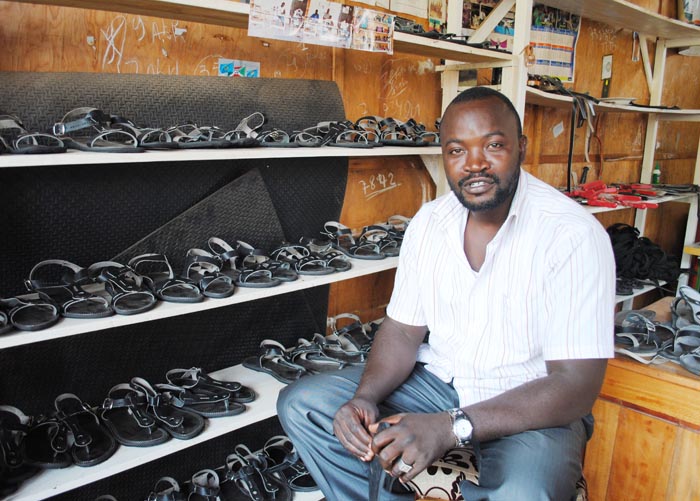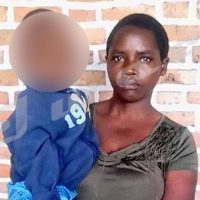Trade fairs take place in EAC countries but very few Burundians participate. The main cause is the lack of many of products to exhibit. However, some of them try to do their best and go to compete with other EAC partners- by Diane Uwimana

“The trade fair lasted 10 days but my products were over just after three days because of their good quality.”©Iwacu
Désiré Ndikumana, aged 31, is a self made-man and fights day after day, to produce a lot of shoes and work hard to improve the quality of his products. “I make different shoes such as sandals for men and women from the goat’s skin”, says Ndikumana.
In terms of quality and quantity, Ndikumana thanks the step he has already undertaken. “At the beginning, I had a small quantity but step by step, I am now able to take part in regional trade fairs with more than two hundred pairs of shoes. The recent example is the regional Jua Kali Trade Fair held at Bujumbura City Council (at Musée vivant de Bujumbura). I have exhibited 100 pairs of leather shoes for women, 50 for men and 80 wooden shoes for ladies. The trade fair lasted 10 days but my products were over just after three days because of their good quality,» he states very proudly but regretting that he hasn’t enough shoes for ten days .
Since he has started to transform goats’ skins, he has already participated in three trade fairs. “The first one took place in 2008 at Kigali (Rwanda). I had only 35 pairs of leather shoes and 20 wooden shoes. It was a regional trade fair that lasted 10 days, but my goods were all bought in one day. The second one was held at Kampala in 2011. There, I increased my production with 80 pairs of leather shoes for men and 30 for women and 40 wooden shoes for ladies. The third one was organized at Bujumbura last year”, mentions Ndikumana.
The raw material comes from goats’ skins from Burundi and Kenya. “The imported raw material is estimated at 2000 USD. From the latter, I can make 300 pairs of leather shoes and ten various bags for documents but I don’t import wood from any country”, indicates Ndikumana.
“From training to the professionalism”
What Ndikumana does, is not a haphazard job, he has learnt it from an Italian father Antonio Balijija from Mutoyi Cooperative, when he ran away during the civil war in 1996. “When we were refugees at “Le Gentil” a kind of hospital of mentally ill people at Kamenge Commune, there was an Italian who protected us from any danger and taught us how to make leather shoes from goats’ skins”, thanks Ndikumana.
Unfortunately, Father Antonio died at Gitega in 1999, killed by thieves who tried to steal his car. “After his death, we were four to continue the background training he gave us”, he underlines.
From 2000 to 2005, Désiré Ndikumana worked for a private employer.
Variety is the spice of life, say English People. Jaroslav Cabar, an expert of Leather Product Manufacturing and Consultant in ONUDI, came to strengthen and deepen Ndikumana and his colleagues’ knowledge and experience. “Thanks to his training, we have created an association “Fédération des Entreprises de Maroquenerie et Coordonerie du Burundi (FEMACOBU)” with the main objective of creating and training others for more production”, says Ndikumana, one of the founder of Femacobu.
According to him, it is necessary to have an address. “After this, I have created my own training center “ATECOM” (Atelier Technique de Coordonerie et de Maroquenerie) with seven employees. My center got funds from the German Embassy. I received four machines and other accessories. The estimate cost was about BIF 11million”, underlines Ndikumana.
For him, producing more shoes should help to compete with EAC partners but the lack of funds remains the main challenge. “When I went to the trade fair, I found that my goods were of the best quality comparing to other EAC partners”, points out Ndikumana.
The same point is shared by E. I., a customer met at Ndikumana’s office: “I always come here to buy shoes because they are strong and nice.”
17 years of working, Ndikumana plans to train other craftsmen from other provinces.
“Cibitoke, Kayanza, Ngozi and Bujumbura City Council are the first target provinces which I am going to focus on in order to create jobs and increase production. Hence, we will compete with other EAC partners not only in terms of quality, but also in quantity”, highlights Ndikumana who is now the father of three children. “I wish that my children would do what I am doing”.
It is worth indicating that a pair of shoes cost about BIF 10 and 12 thousand and they are sold at Musée Vivant and the Femacobu’s office beside the “Université du Lac Tanganyika”.



















 IWACU Open Data
IWACU Open Data

